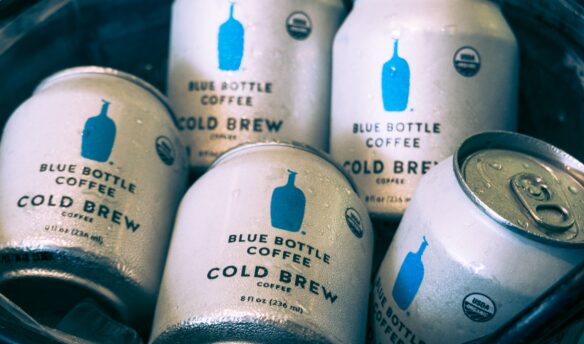Who ordered the pork-flavored latte? Plus, coffee companies push to delay deforestation legislation and lots of unionization news.
‘Europe’s Coffee Traders Urge EU to Delay Deforestation Rules’ – via Bloomberg
This week, the European Coffee Federation (ECF) urged the European Commission to delay implementing looming anti-deforestation legislation (EUDR). The legislation will require companies importing coffee into the EU to prove that their products did not contribute to deforestation.
To express their concern, the ECF, a trade organization representing leading European coffee companies, wrote a letter to Ursula von de Leyden, head of the European Commission. In the letter, the ECF states that implementing anti-deforestation legislation would negatively impact coffee farmers around the globe and “the disruptions will be shattering, not least for the millions of smallholder producers for whom the EU is a significant marketplace.”
The ECF wants the EU to delay the law’s implementation, which will be enforced at the end of 2024 for companies with more than 250 employees. The law will impose financial penalties on companies that fail to prove that commodities imported into Europe are not linked to deforestation, but many analysts in the coffee sector believe the burden of proof will be pushed onto smallholder coffee producers.
The new legislation has caused much consternation in the coffee industry. Europe accounts for almost a third of all coffee consumption, and the big players have rushed to develop compliance measures. JDE Peet’s partnered with the sustainability auditor Enviritas to monitor its supply chain, while the commodity futures market, the Intercontinental Exchange, launched its own compliance service. Meanwhile, Lavazza complained that the complexity of the coffee supply chain means that the regulation will be “difficult to implement.”
The letter goes on to say that the ECF and its members “remain fully committed to the spirit of the EUDR and will continue to work to ensure that the overall objective set out by the European Commission is met by all, when the time is right, without the numerous unintended consequences.”
Aside from the EUDR potentially penalizing smallholder coffee producers, some importers are simply “turning away” from sourcing coffees from Africa due to perceived difficulties in complying with the new law. “Nowadays from Europe no one is interested in our coffee,” an Ethiopian cooperative representative told a World Coffee Alliance webinar.
‘Starbucks to Roll-out New Accessible Store Model in the US to Promote Inclusivity’ – via World Coffee Portal
Starbucks has launched a new framework to make the company’s US stores more accessible and inclusive for customers and staff.
The Inclusive Spaces Framework initiative includes upgrading point-of-sale technology, building wider passageways, installing power-operated doors, optimizing acoustics and lighting, and redesigning brewing equipment with larger dials.
The first store designed under the Inclusive Spaces Framework opened in Washington, DC, on February 16; Starbucks has committed to using the framework across all newly built and renovated company-owned locations in the US.
As Daily Coffee News notes, Starbucks’ sheer size and influence means that this new framework will likely inspire other companies to adapt and build more inclusive cafes.
“At Starbucks, we have challenged ourselves to imagine what’s possible when we take a closer look at the many ways our partners and customers interact with us and experience our stores every day,” said Katie Young, senior vice president of store operations. “Building and scaling an Inclusive Store Framework is central to our mission of connection and will lead to greater access for all.”
Fourteen percent of Starbucks’ US retail workforce identified as having a disability last year. The company also operates 18 Signing Stores worldwide, which provide employment opportunities and gathering spaces for Deaf and Hard of Hearing individuals.
‘Coffee Farmers Reap Big as Reforms Gain Momentum’ – via the Star
In August 2023, the Kenyan government passed new legislation to reform the country’s coffee industry. Since then, things have been a bit chaotic, but farmers are finally beginning to see positive change.
After new laws were passed suspending all marketing and brokerage licenses, the Nairobi Coffee Exchange (NCE) closed for a month. In Kenya, marketing agents are middlemen who broker deals between farmers, co-ops, and exporters. The suspension and shutdown were part of the government’s attempt to reform this process, which it said was dominated by “coffee cartels,” large companies that use multiple subsidiaries to manipulate prices and control the sector. The government said this would put more control—and profits—back in the hands of farmers.
Even after the exchange reopened, the amount of coffee traded stayed low, dropping 95% from the previous year. The impact on millers—those who finish processing and sort coffee ready for export—has been widespread, with many closing temporarily due to licensing issues. NKG Coffee Mills Limited shut down operations in the country altogether, laying off staff and blaming the new law for its inability to secure a milling license.
However, more coffee is being traded than ever. At the most recent NCE auction, 27,046 bags were traded, a 64% increase over the previous week and the highest recorded since the new regulations were enacted. Prices are also going up: according to the Star, the reforms “have started bearing fruits with farmers cashing in on good prices,” which “[point] to the benefits emerging from the bold reforms put in place by the government.”
Kirinyaga Slopes Brokerage Company Ltd traded the highest volume of coffee at this most recent auction, which is notable because the brokerage is wholly owned by farmers from Kirinyaga and is one of the new traders who have had licenses issued since the reforms.
‘Pork Flavored Coffee is Starbucks’ Newest China Pitch’ – via CNN
Starbucks customers in China can celebrate the Lunar New Year with a pork-flavored latte.
The company has released the “Abundant Year Savory Latte,” which CNN describes as including espresso, milk, and Dongpo Braised Pork Flavor Sauce and comes “with extra pork sauce and pork breast meat for garnish.” Yours for the price of 68 yuan ($9.45).
The drink offers “unexpected savory and sweet flavors” and brings “traditional New Year customs into coffee,” Starbucks wrote on the social media platform Weibo. The pork latte is divisive—Business Insider reports that some customers found it “unexpectedly delicious” while others thought it was disgusting.
Still, others were more focused on the price. “For 67 yuan, I could eat a plate of braised pork, then go to Luckin and drink two lattes,” wrote one user on Weibo. Luckin Coffee has positioned itself as a cheaper alternative to Starbucks in China, with heavy discounts and easy mobile ordering. Luckin is no stranger to innovative drink offerings—it has previously sold a limited-edition liquor-laced latte and a cheese-flavored latte.
More News
‘Quentin Tarantino’s Coffee Shop Dedicated to Pam Grier Is Now Open at the Vista Theater‘ – via Eater LA
‘Saudi Arabia Signs International Coffee Agreement’ – via Global Coffee Report
‘Intelligentsia Coffee Set to Make International Debut in South Korea‘ – via World Coffee Portal
‘You Need To Read This 100% Real Coffee Shop Story That Definitely Happened‘ – via Sprudge
‘Roasted: The Lawsuits Faced by America’s Biggest Coffee Chain‘ – via Law Street Media
‘Café William Unveils CA$47m Energy-efficient Production Facility’ – via World Coffee Portal
‘Avocado In Coffee Is The Latest TikTok Trend‘ – via Sprudge
The Week in Coffee Unionizing
- Workers at 21 Starbucks locations across the US announced their intent to unionize on February 20, the most ever to unionize in a single day. The workers sent a joint letter to CEO Laxman Narasimhan asking for “higher wages, fair and consistent scheduling, improved benefits, and a safe and dignified workplace. We have been met with higher and higher expectations without being given the resources to meet them.” Although the unionization rate has slowed recently, Starbucks Workers United said that the number of stores announcing together shows that the unionization drive is intensifying.
- This week, the Guardian reported that students, faculty, and workers at 25 colleges called on their administrators to cut ties with Starbucks over its response to workers’ unionizing. Past calls to break ties with Starbucks have been successful: students at Cornell managed to convince the university not to renew its contract with the company, and petitions are currently circulating at schools like UCLA and UC Riverside. On February 22, “Starbucks gets an F” protests took place at campuses across the nation, from the University of Chicago to Georgetown. “We want to make sure that our tuition dollars aren’t continuing to enable this company and the injustices they commit,” said David Ramirez, a student organizer at UCLA.
- Unionized workers in Chicago and Philadelphia have filed 22 complaints against Starbucks, alleging that the company violated Fair Workweek laws. These regulations require large employers to provide predictable work schedules and compensation for any schedule changes, something the complaints allege Starbucks didn’t offer. “Starbucks workers have made it very clear that they’re not going to back down and will use every tool they have to try to make Starbucks a better place to work, from fighting for a fair contract to holding the coffee giant accountable to our city’s Fair Workweek laws,” a Workers United spokesperson told the Philadelphia Inquirer.
- Speaking of Philadelphia, the city’s barista union, Local 80, has called for a boycott of Ultimo Coffee due to the company’s refusal to agree to a union contract. Workers previously authorized a strike as part of their negotiation with the company. Local 80 asks customers to “suspend their use of Ultimo Coffee products until owners settle a contract with their workers.” Talks over a first contract at Ultimo have been fraught, with the two sides trading complaints. In January, workers at two locations voted to decertify their union. “We are disappointed that the Union has chosen to attack our small business, where we guarantee our employees earn a minimum of $20/hour with tips, and they make an average of more than $25/hour,” the Ultimos said in a statement.
Beyond the Headlines
‘Late-night Chai and Covert Flirting: Why US Muslims Flock to Yemeni Cafes’ by Ahmed Ali Akbar
‘Is Coffee … Good?’ by Ashley Rodriguez
‘Are These the Most Beautiful Coffee Shops in the World?’ by David Tran









